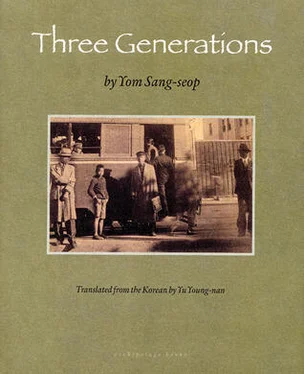The old man had written other instructions. Deok-gi was to supervise and safeguard the provisions for the underaged and the shares for his mother and his wife. For Gwi-sun and Deok-hui, he was to handle their shares until marriage, and for his mother and his wife, he would oversee their portions until his death. Evidently, the old man had entrusted Gwi-sun’s future to Deok-gi, probably in the belief that the Suwon woman wouldn’t remain with the family forever. He also made provisions for his daughter-in-law and granddaughter-in-law in case some future adversity, such as divorce, befell them. The will read:
Since the possession of assets may, in some cases, bring harm to the descendants that inherit them, I am dividing them as specified while I am alive. This is my absolute intention, and it shall not be changed. As the head of the Jo family household, I entrust to Deok-gi the means of life from one generation of the Jo family to the next. Deok-gi’s portion is not for him alone, and he must ensure that he will never take even a penny of it without consideration.
The grandfather then went into details. The distribution of the assets was to be done openly after his burial. Specifically, the women would receive their shares after the three-year period of mourning, a stipulation seemingly made to bind the Suwon woman in particular. Even if she were to marry again, he wanted her to do so only after the grieving period for her husband was over, at which time the four-year-old Gwi-sun would be of school age — old enough to be raised by anyone.
The date on the will was only some ten days earlier, right before he had been moved to the main room. Imagining that his grandfather had woken up in the middle of the night and, though gravely ill, crawled to the safe and steadied himself by leaning against it as he took out the contents and then returned them, Deok-gi’s heart went out to him, tears welling up in his eyes. Deok-gi disliked his grandfather’s temper, his outdated ideas, and the hostility he bore toward his own son, but seeing the extent to which the old man was concerned about his descendants, Deok-gi was boundlessly grateful. His grandfather couldn’t have arranged such a distribution overnight; he must have gone about it slowly from the time he was healthy. Deok-gi’s eyes brimmed over with tears as he pictured how sad and lonely the old man must have felt as he made these preparations, without telling anyone. People had commented — even within earshot of Deok-gi’s — that the old man’s assets couldn’t be safe, for in his old age he had become completely enraptured by the Suwon woman. Nevertheless, only two hundred fifty bags of rice were set aside for her and their daughter. Considering that Sang-hun was allotted three hundred bags, their share was quite big, but it was rather on the small side in the scheme of things. Sang-hun’s paltry share was the result of the old man’s obstinacy, a response to his son’s Christianity, which prohibited its believers from performing ancestral ceremonies. In the end, the old man’s feudal ideas prevailed. But would Deok-gi carry on his grandfather’s dying wishes after he inherited his wealth? Would he maintain the ancestral shrine, as befitting his grandfather’s trust, as faithfully as he would keep his grandfather’s safe?

After putting the documents back in the safe, Deok-gi noticed that the Suwon woman, standing on the stone step, was peeking in through the tiny windowpane. How long had she been standing there?
She dashed up to the veranda, without properly taking off her curved-tip rubber shoes, and threw open the sliding door. Ill at ease and unable to get the thought of the safe out of her head, she had hurried into the outer quarters to see what was going on. When she noticed that the safe door was open, she jumped in, fury dancing in her eyes.
“I’m on my way to the hospital. Is there anything your grandfather wanted from home?”
Slamming the safe door shut, Deok-gi looked behind him. The Suwon woman appeared ready for a showdown, her hands buried deep in her gray coat pockets, her eyes blazing.
“You’re having a grand time! Opening the safe whenever you please. ” The Suwon woman stared at the bunch of keys as Deok-gi removed them from the keyhole.
Meeting her eyes, Deok-gi once again thought, thanks to these keys, my own life might be cut short. He dropped them into his pocket with a jangle and answered sardonically, “Is there something else to take to the hospital other than the fur-lined coat?”
The Suwon woman’s expression changed, and a sly, ingratiating smile spread across her lips. “So what’s inside?”
“What do you mean by that?” Deok-gi spat out disagreeably.
The Suwon woman regretted her awkward phrasing and began to pout. “How much has he set aside for me? That’s what I want to know,” she challenged.
“Do you really think now is the time to talk about that?”
“Did you take out the contents because it’s time to do so? I’d like to find out what’s there for me because I’ve got to make a living, you know. What’s the use of doing nothing now and then harping about it after his death? What am I supposed to do if I’m shooed away empty-handed?”
“If you knew how big your share is, you’d go to my grandfather and make a fuss despite his upcoming operation, wouldn’t you?”
“And why shouldn’t I? He’d better give me at least five hundred bags. I have to support my baby! No one can imagine how I’ve suffered, coming here at a young age and taking all sorts of abuse, constantly looking over my shoulder. ”
Secretary Ji, returning from the market, came in carrying something in a paper bag. Sending the manservant to the inner quarters with a bush-clover basket, he glanced at the scowling Suwon woman.
“Are you going to the hospital?” he asked her.
“Why do you want to know?” she snapped. It irritated her that Secretary Ji was not on her side; she had to be careful with everything she did around him.
“I found some plump, delicious-looking tangerines at the market, so I bought some for the master, but I have no time to visit him because of all I have to do here,” he said, lifting the bag in his hand. Noticing Deok-gi, who was coming out to the veranda, he added, “I bought them with my own money.”
“It doesn’t matter whose money you used. I’m glad that you bought them,” Deok-gi answered.
“Well, I like to be clear when it comes to money. Anyway, I don’t know whether I can visit the master again today, so — ”
“Don’t worry,” the Suwon woman said sharply, interrupting him. “If the master wants some tangerines, I’ll pick some up for him on my way. Keep them a long, long time and eat them yourself!”
“It’s not as if you’re short of money, but I bought these especially for him!” barked Secretary Ji, usually so mild and polite. “I’ve served him for almost twenty years, and now that I see him hospitalized, I wish I could depart for the other world first.” His eyes blinked behind his eyeglasses. “I’ll wrap these up in a cloth. Peel some for him as soon as you arrive at the hospital. He must be thirsty.” He entered the room without a second glance at the Suwon woman.
Deok-gi felt a pang of emotion. He was grateful to Secretary Ji and took pity on him, letting the words “especially for him” sink in. What would it be like if my grandmother were still alive? Deok-gi wondered.
From inside, standing at the window, Secretary Ji held out, instead of the bag of tangerines, a brownish scarf. “What is this doing here?” he muttered. “It looks like Chang-hun’s scarf. Why would he leave it behind when it’s freezing outside?”
Читать дальше













